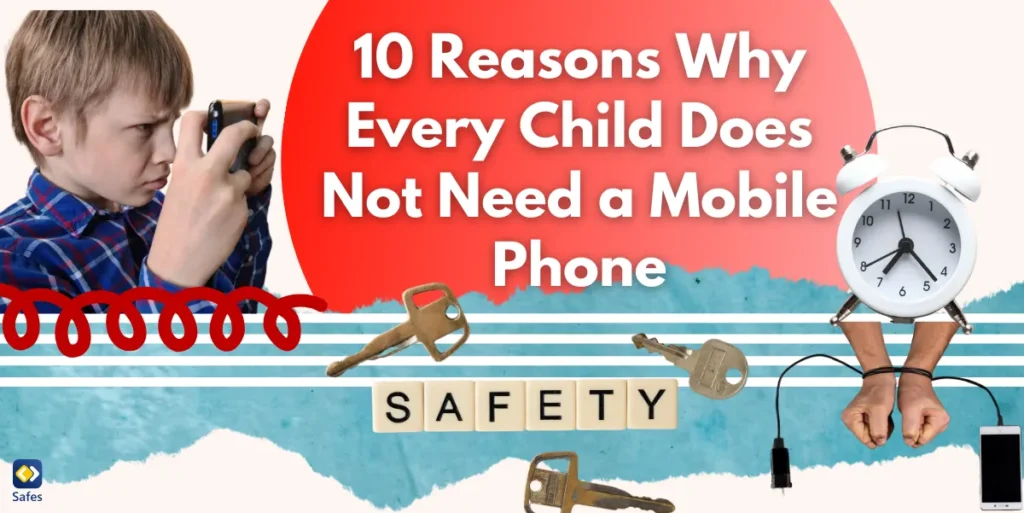In today’s digital age, mobile phones have become an inseparable part of our daily lives. From communication and education to entertainment and social connectivity, smartphones offer undeniable benefits. However, this doesn’t necessarily mean they are suitable—or even necessary—for every child. The growing trend of young children owning mobile phones raises critical concerns regarding mental health, safety, screen time addiction, and exposure to inappropriate content.
While parents may feel pressured to hand over a mobile device to their children for safety or peer-related reasons, it’s essential to weigh the potential risks and consequences. Children, especially younger ones, may lack the maturity and self-discipline needed to use mobile phones responsibly. Instead of enhancing their development, unrestricted access to a smartphone might cause long-term harm to their emotional well-being, academic performance, and social interactions.
This blog explores 10 compelling reasons why every child does not need a mobile phone. Each point delves into the associated risks and provides insights to help parents make informed decisions about their child’s mobile device usage.
1. Exposure to Inappropriate Content
One of the biggest concerns of giving children mobile phones is their unrestricted access to the internet. The web is filled with inappropriate content, including explicit material, violence, and harmful ideologies. Children, with their natural curiosity, might stumble upon such content unintentionally, leading to emotional and psychological consequences.
Parental controls and content filters can help reduce exposure, but they aren’t foolproof. Kids are often tech-savvy and may find ways to bypass these restrictions. Without continuous monitoring, parents can’t always ensure their children are navigating safe online spaces.
Instead of handing children personal devices, parents can introduce shared family devices with stricter supervision. This minimizes the chances of accidental exposure and allows parents to guide their children’s online behavior responsibly.
2. Increased Screen Time Addiction
Smartphones are intentionally designed to be addictive. Social media notifications, mobile games, and endless streaming content create a cycle of instant gratification that can trap young minds. Excessive screen time has been linked to poor sleep patterns, reduced physical activity, and impaired academic performance in children.
Children are still developing self-control, making it difficult for them to set boundaries on their screen time. They may neglect essential activities like studying, playing outdoors, or spending quality time with family. This imbalance can lead to long-term health and social consequences.
Parents can set screen time limits on shared devices and encourage offline activities like sports, reading, or creative hobbies. Building healthy habits early reduces the dependency on digital entertainment for happiness.
3. Cyberbullying and Online Predators
Social media platforms and messaging apps open up avenues for cyberbullying and contact with online predators. Children may not always recognize harmful interactions or realize when they’re being manipulated. The anonymity of the internet allows harmful individuals to exploit vulnerable users easily.
Victims of cyberbullying often suffer from anxiety, depression, and decreased self-esteem. Unlike physical bullying, online harassment can happen around the clock, leaving children with no escape. Parents often remain unaware until the damage has been done.
Without personal mobile phones, children’s online exposure is significantly reduced. Parents can instead introduce controlled access to the internet through family computers or monitored devices.
4. Privacy and Data Security Risks
Children are often unaware of the consequences of sharing personal information online. Whether it’s posting their location, photos, or school details, this data can be misused by cybercriminals. Mobile apps frequently collect user data, and children may unknowingly grant permissions without understanding the risks.
Data breaches and identity theft are real threats, and children are easier targets due to their lack of awareness. They may also fall for online scams or phishing attempts, putting themselves or their families at risk.
Parents can educate children about digital privacy and implement strict rules about online sharing. Delaying personal phone ownership reduces exposure to such risks until children are mature enough to understand online safety.
5. Negative Impact on Mental Health
Studies have shown a strong link between excessive smartphone use and mental health issues in children, including anxiety, depression, and social isolation. Social media platforms, in particular, can contribute to feelings of inadequacy and low self-esteem due to comparisons with others.
Notifications and constant connectivity can overwhelm children, causing digital fatigue. They might struggle to disconnect, leading to heightened stress and disrupted sleep patterns. Limiting smartphone access helps protect children from these mental health triggers. Parents should focus on fostering real-world interactions, encouraging open communication, and building strong emotional resilience in their children.

6. Poor Academic Performance
Smartphones can be a major distraction for children during study hours. Notifications, games, and social media constantly compete for their attention, making it difficult to focus on homework or school projects.
Excessive smartphone use has been linked to lower academic achievement and reduced cognitive skills. The habit of multitasking between study materials and mobile devices hinders effective learning.
Creating a tech-free study zone and avoiding personal mobile devices can greatly improve focus and productivity. Educational apps and shared devices can still provide value without unnecessary distractions.
7. Financial Costs
Smartphones, data plans, and paid apps come with recurring costs. Children may accidentally make in-app purchases or sign up for expensive subscriptions, leading to unplanned financial burdens for parents.
Additionally, children are prone to losing or damaging devices, resulting in costly replacements. In most cases, these financial costs outweigh the perceived benefits of children having personal smartphones. Instead, families can invest in shared devices and teach children financial responsibility gradually.
8. Sleep Disruption
The blue light emitted by smartphone screens interferes with the production of melatonin, the hormone responsible for sleep regulation. Children who use phones late at night often struggle to fall asleep or stay asleep.
Poor sleep quality affects children’s physical health, emotional well-being, and cognitive performance. The temptation to scroll through social media or play games before bedtime can become an unhealthy habit and cause eye strain. Parents should enforce screen-free zones in bedrooms and set strict boundaries on nighttime device use.
9. Lack of Physical Activity
Excessive smartphone use often replaces outdoor play and physical activities. Children who spend too much time on their devices may develop sedentary habits, leading to health issues like obesity and poor physical fitness.
Physical activity is crucial for developing motor skills, strength, and overall well-being. Smartphones can hinder these essential activities. Encouraging outdoor play, sports, and family activities helps children develop healthier habits without relying on mobile phones for entertainment.
10. Social Skills Decline
Children who spend excessive time on mobile phones may miss out on face-to-face social interactions. Over-reliance on texting and social media can prevent them from developing essential communication and interpersonal skills.
In-person interactions teach empathy, listening skills, and conflict resolution—qualities that are harder to develop through digital conversations. Parents should prioritize real-world social experiences and limit reliance on digital communication.
3 Solutions for Parents Whose Children Need or Want Mobile Phones
Here are three solutions for you if you decide to get your child a mobile phone for any reason:
1. Opt for a Basic Phone Instead of a Smartphone
If parents feel their child needs a mobile device for safety or communication, opting for a basic phone (or “dumb phone”) instead of a smartphone is an excellent compromise. Basic phones allow calling and texting but lack access to social media, gaming apps, or internet browsing. This minimizes distractions, reduces exposure to inappropriate content, and lowers the risk of screen addiction. Additionally, basic phones are often more durable and cost-effective, making them a practical choice for younger children.
Parents can set clear rules about when and how the phone can be used—such as during school hours or emergencies only. This approach ensures children stay connected without falling into the digital pitfalls of smartphone use.
2. Implement Parental Control Apps
For children who genuinely need a smartphone, parental control apps like Safes Family can help create a secure digital environment. These tools enable parents to monitor app usage, set screen time limits, block inappropriate content, and track device locations in real-time. Parental control apps bridge the gap between independence and supervision, giving children freedom while ensuring their safety online.
It’s essential for parents to openly communicate with their children about the reasons behind these restrictions. Transparency fosters trust and helps children understand that these controls are for their protection, not punishment.
3. Establish Clear Rules and Screen Time Limits
Setting clear boundaries is crucial when children are given access to mobile phones. Parents can create family tech rules, such as no phones during meals, no screens an hour before bedtime, and designated device-free zones like bedrooms. Screen time should also be limited and balanced with other activities like reading, outdoor play, and family time.
Parents can also lead by example, demonstrating healthy mobile phone habits themselves. Regular check-ins and open conversations about digital safety encourage responsible mobile use and build accountability in children.
Conclusion
Whether kids should have cell phones depends on their age, maturity level, and specific needs. For younger children, a smartphone might be unnecessary and potentially harmful due to risks like screen addiction, cyberbullying, or exposure to inappropriate content. However, for older children and teenagers, a phone can be a useful tool for communication, safety, and education. Parents should weigh the benefits, such as staying in touch during emergencies, against the risks, and ensure that proper parental controls and boundaries are in place to foster responsible usage.
Take control of your child’s digital habits with Safes Family, the leading parental control app. Safes Family offers screen time management, content filters, and real-time monitoring across iOS and Android devices. Start your free trial today and create a safer, healthier digital environment for your child.




